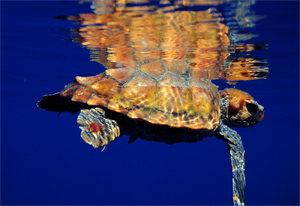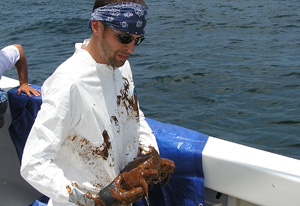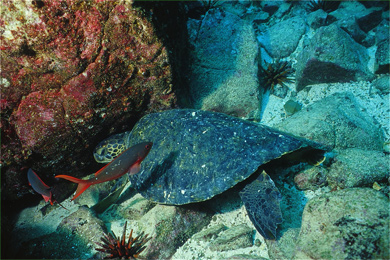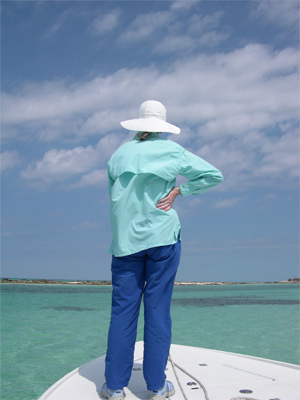The following are a few examples of studies currently underway that represent the breadth of our studies.
“Mystery of the lost year”
In the 1950s, Archie Carr coined this phrase to describe the unknown early life stage of green turtles after they leave the nesting beach as hatchlings and before they return to shallow waters at the size of a dinner plate. The mystery has not yet been solved, but we are making progress.
We used stable isotopes to reveal they are in open ocean habitats and have a carnivorous diet. However, we do not know where they are geographically. We are now using trace elements to try to answer this question.
Impacts of the BP oil spill on sea turtle populations in the Gulf of Mexico
Brian Stacy, an ACCSTR faculty member, is conducting necropsies on hundreds of sea turtle carcasses from the Gulf of Mexico to determine what were the immediate effects of the oil spill on sea turtles and how will the populations be affected into the future.
Threat from Hybridization
In Brazil, a substantial proportion of the hawksbills that nest in the State of Bahia are actually hybrids of hawksbills and loggerheads. We are comparing mate choice, hatching success, foraging, and movement patterns in hybrids and pure hawksbills and loggerheads. We will be able to answer the critical question: is hybridization a serious threat to the continued existence of the hawksbill population in Bahia?
Healthy Marine Ecosystems
What are the roles of sea turtles in marine ecosystems? What population densities are needed to maintain healthy and diverse marine ecosystems? These questions receive ongoing emphasis in our program. Currently, we are assessing the roles sea turtles play in Atlantic food webs.
Biology of sea turtles in The Bahamas
The expansive shallow banks in The Bahamas provide foraging habitat for large populations of sea turtles. With a network of collaborators throughout the Archipelago, we are studying the movements and demography of these populations, as well as tracking the recovery of these populations following the total ban on turtle harvest that was enacted in The Bahamas in September 2009.




